#hadestown is a fantastic example of this
Note
Could you elaborate more on "Amber shaped Persephone as much as Anais and Rachel did"? Like did she actually have say in things like lyric changes or staging or is it more about her actual legacy and how long she was in the role for?
The second one! to my knowledge she didn't have any direct say in the actual book/script, but ever since they started workshopping the show it was Amber's personality, acting, singing, etc that helped to shape Persephone. She's a very unique and one-of-a-kind performer and her specific mannerisms are what made Persephone, Persephone. Like, I don't really know how to describe it, but if you've seen her in other shows or at solo concerts you can definitely see a very strong overlap between "Amber characteristics" and "Persephone characteristics" and how Ambersephone was a perfect mix of acting as a character while also using her own mannerisms.
Amber was in the show for six years, across four different productions, and that's not even counting workshops. Theatre critics and fans genuinely viewed "Amber Gray" and "Persephone Hadestown" as synonymous in a lot of ways.
Many of the replacements have done a fantastic job at continuing on Amber's legacy while still putting their own unique twist on the role, and that's amazing! Amber is not an easy person to follow and I really do love most of her replacements. I love how they honor Amber's legacy while putting their own spin on the character.
Also there's just so many aspects of Persephone's character that are just...Black culture. For example, her dance in Way Down Hadestown is a jazz funeral. And tbh it's really offensive to have white actors in that role doing the same thing. If Amber had never played Persephone, Persephone would be a completely different character.
Persephone was exclusively a Black/mixed-Black role for almost 5 years.
(As a white fan, I'm not going to comment on non-Black POC playing the role. I ADORE Maria-Christina Oliveras and Shea Renne, who both are Asian-American, and I am not going to comment on whether or not it's 'okay' for mixed Pinoy actresses to play a Black-coded role, because while I do think Persephone should ideally be Black, I'm not going to advocate AGAINST Filipina leads. White Persephone is a million times more offensive than nonBlack-POC Persephone ever will be. That being said, since I've acknowledged that Way Down is a jazz funeral, I do wish that Shea and Maria had had the chance to honor Filipino culture in their portrayal, in the same way that every other Persephone honors Black culture.)
Basically: Amber Gray and Amber Gray's specific portrayal of Persephone is literally what built Persephone. Especially from a racial aspect, there's so many parts of Persephone's character that you literally cannot separate from African-American culture and casting white people as Persephone is so disrespectful to Amber's - a biracial black woman's - legacy in the show.
Also, if Amber had actual say in Persephone's lines, I can guarantee the Chant II verse would never have been cut.
78 notes
·
View notes
Text
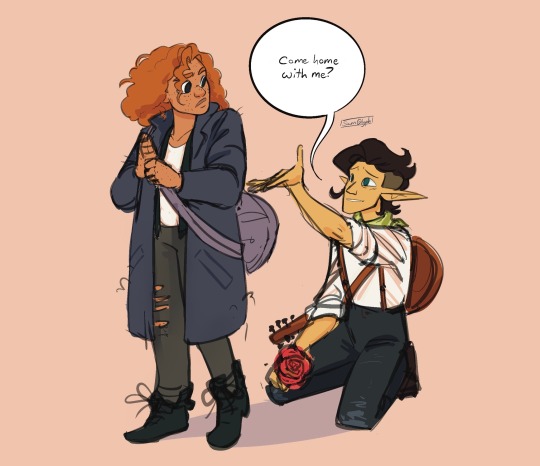
I got to go see Hadestown last night and it absolutely ruled and it’s such a fantastic example of storytelling and cyclical narratives and when I have time on my hands I’d love to do some serious art for it but for now heheheh putting ocs in the media.
#I got home drew this in like ten minutes flat and then went the fuck to sleep#my ocs#original characters#hadestown#my art#sketches#Woodward#steller's jay#Pieridae#as always just in case: Steller (left) uses he/him#and Pieridae uses she/he/they
59 notes
·
View notes
Note
It's a nice evening to send random asks. Please tell me your top 5 songs from musicals I should try singing, before I got SIX The Musical soundtrack stuck in my head for good. Also do you like covers of musical songs in other languages? :>
Hello!
Getting SIX stuck in your head doesn't sound like a bad thing, in my opinion- lord knows I would prefer it over some of the songs that I get stuck in my head. 😅
For the latter part of the question: sure! I can't say I exactly go looking for the songs, to be completely truthful, but I really like what they did for a West Side Story revival and translated and sung half the songs into Spanish; "The Quartet" from that revival album is, to me, way more powerful having it sung in both Spanish and English, blending together beautifully.
For the former part of the question- here's my top 5 favorites- only English, alas:
1. Nonstop from Hamilton- a go to favorite for me; this is the song I play when I want to get shit done, when I need a boost, when you just want to reminder to go for your dreams and a fine example of Lin Manuela Miranda favorite style of blending chorus.
2. Masochist from Love Hate Nation- from "Be More Chill" Joe Iconis, this is from a later musical of his and a queer anthem bop; don't let the title fool you, in it the actress sings about how she "isn't no Masochist" and to be truthful of who you are. The song is also originally sung by wonderful trans actress Emerson Mae Smith, who brings power and soul into the voice of Kitty, who sings this queer pride ballad.
3. I'm Alive from Albert Cashier Musical- definitely a hidden favorite from a concept musical album, this is from a musical I hope to one day get a proper album and production; the musical is based on the story of Albert Cashier, a ex Union Civil War Soldier who went to trial as it was discovered, years later & after the war, that he was AFAB. It tells 2 stories; one where he's old and stuck in a hospital, and one when he's in the war. I saw a concert version performance at Greenwich Village and fell in love with the whole musical, which is a mix of folk-pop, and trans celebration. So far there's only 2 songs available on YouTube, and "I Gotta Try" is one you definitely need to listen to, but "I'm Alive" has such a good beat and a catchy chorus that I just love.
4. Paciencia y Fe from In the Heights (Original Broadway Version)- from the older hit musical of Manuel Miranda, Paciencia y Fe is a gorgeous song about past dreams and hopes, and Olga Merediz voice is *phenomenal* hands down. Honestly, I have a soft spot for the musical in general, as it was my first show I got to work on outside of academic (it was a regional production, nothing fancy, but still,) and truly, while I saw the movie and liked it well enough, the Original Broadway version is going to top that over the film in my heart. To be honest, I would love to have Merediz sing this is full Spanish- it would be 1000% *amazing*
And there's a lot of other favorites as well- Hadestown is a fantastic album, I enjoyed Dear Evan Hansen, I'm a sucker for La Vie Boheme from Rent- I'm old, lol.
"Prom" has some great songs, and I like Be More Chill- "Michael in the Bathroom" c'mon- also "Last on Land" which is from Joe Iconis (from another musical of his that hasn't had a full performance yet) is a favorite that speaks to my soul and okay, I listen to this one pretty often but hell, I got to be truthful and say:
5. For Good From Wicked- Listen. Listen. Wicked was my first official Broadway tour, it was the first showtune album I listened to that wasn't from my parents' collection (I grew up listening to Andrew Lloyd Webber) and for one Christmas I got a playbill poster that has since been professionally framed. Wicked is near and dear to my heart. And as much as "Defying Gravity" and "Popular" are, well, *popular*, "For Good" is a great song, as it really shows the balance between Menzel's & Chenoweth's voices; you get it in the power ballad "Defying Gravity" but to a more subdued way that I appreciate; it's a goodbye, it's a thank you, it's I'm sorry, it's two women who aren't sure if they changed for the better, but fuck, they changed, and they changed because of their relationship. And they're still grateful that they had each other in their lives.
Hopefully this answers your question! Thanks for the ask!
1 note
·
View note
Note
As a worshipper of Persephone, do you have any opinions (positive or negative) on Hadetown the musical? It has one of the most unique characterisations of her I've ever seen. And whilst they don't have a very kind portrayal of Hades, they somehow still managed to depict their relationship in what I thought was a quite realistic and ultimately really sweet in a way?
I personally got into the musical before I got into Helenic Polytheism and I loved it, and I still love it despite everything because I've chosen to look at it kind of in the same way you mentioned mythology in your podcast. Like, even if the musical itself is "about" Hades and Persephone, it's not really about them, they're just placeholders for more abstract concepts - like for example capitalism, and climate change and what have you. So I personally see it as more of a critique on society using the gods, rather than of the gods themselves.
Anyways, I'd love to hear your thoughts, if you've listened to it!
I actually had the pleasure of seeing Hadestown live! I absolutely LOVED it! I personally didn’t mind the portrayal of Hades maybe because I’m used to like Hades = The Devil and this portrayal was a lot more sympathetic (and closer to actual mythology Hades) and treated Hades and Persephone as a typical married couple who just needed to be reminded of why they fell in love in the first place. I thought their love story was beautiful and very relatable. And I absolutely adored Persephone! That portrayal is the closest to the Persephone I know and work with. So I was def very thrilled!!
Also Hermes. Fucking fantastic! Everytime I see Andre De Shield I’m like “It’s Hermes!” because he just embodies the swagger and coolness of Hermes. He was honestly my favorite.
See the thing is, I’m not necessarily looking for “accurate” (whatever that means bc we all see the gods differently) depictions of the gods in media anymore. I want something NEW. I’m sick of the same tropes, stories, and depictions they continue to recycle over and over again. So i essentially enjoyed Hadestown because it was something different. Something fresh. Something a lot more relatable and human. And the music was bomb!
I’m gonna give a more in-depth breakdown of my feelings about Hadestown for my Gods in the Media series, but you know spoiler...i enjoyed it! lol!
34 notes
·
View notes
Text
March 9, 2021: Orpheus (1950) (Part One)
Greek mythology was my first mythological love.

And yes, that is ironically a very cliché thing to say about Greek mythology, since it’s by FAR the most popular and well-known mythology in the Western world, but...what can I say, I’m a sucker for the classics.
When I was 6, my mom got me a copy of the Odyssey, followed by D’Aulaire’s Book of Greek Myths, and that book was my SHIIIIIIIIIIT. From the Titanomachy to the Trojan War, from Decaulion to Daedalus, from the Lernaean Hydra to Ladon, and from Zeus to Dionysus (my second favorite Olympian), I LOVE Greek mythology.

There have been countless adaptations of these stories over the last century of so, some better and more faithful than others. We got Blood of Zeus (which I...genuinely dislike) on Netflix last year, Lore Olympus is a fantastic webcomic and modernized retelling of the universe of stories in general (fuck Apollo, that’s all I have to say), Hercules by Disney is fun (though extraordinarily inaccurate), and who doesn’t like some Percy Jackson (the books, not the movies)?
Today’s entry won’t be the first of the Greek mythology stories this month; after all, it’s DEFINITELY fantasy, so there were going to be a few entries in here. Some will come pretty close to each other later this month, but for this one, we’re jumping forward 10 years from The Thief of Bagdad to 1950. Let’s get back to France, shall we?

Famous for his adaptation of Beauty and the Beast is Jean Cocteau, legendary French surrealist filmmaker. His stylings definitely capture a sort of practical magic, compounded with clever angles and fascinating visual and practical effects. It’s evident with the classic fairy tale, which I would’ve done this month had I not already seen it. So, instead, we’ll be looking at the middle film in a trilogy known as Cocteau’s Orphic trilogy. This is, apparently, the most important one. And that makes sense, since it’s focused upon...
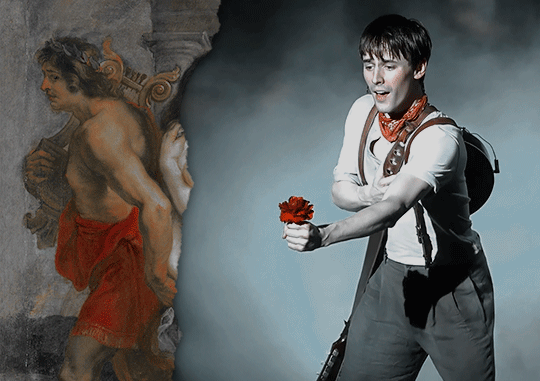
Is Hadestown good? I’m real tempted to find a way to watch it, and it sounds like it’s just up my alley. I’ll probably check it out one of these days.
Orpheus was (maybe) the son of Calliope, the muse of poetry, and Apollo, god of music. Maybe. Parentage differs based on the retelling. No matter the parents, he was renowned for his charm and grace, as well as his voice and music. He was loved by animals, nymphs, and maidens alike. He was invited to be the Bard of Jason’s DnD group (AKA the Argonauts), and used Bardic Performance to inspire his comrades (and also helped them overcome the sirens by singing EVEN LOUDER).
But the one whom he loved most was his wife, Eurydice. Unfortunately, a satyr (AKA horny horned half-goat man) chased her right into a viper’s nest, where she was bitten and died. Orpheus was CRUSHED, and his song was so depressing that even the gods cried. They said, “Dude, go to the Underworld, get back your lady from Hades, please!” And he did.
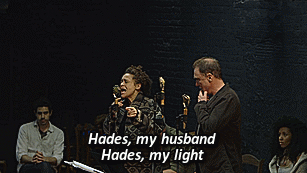
Hades, the old romantic that he secretly is, agrees to let Eurydice’s soul, on one condition. That he doesn’t look back at her as she follows him out. Orpheus agrees, but the man can’t stop himself from looking back to make sure that she’s there. And she was...and then she wasn’t. So, our sad boi fucked up, and then...well, it’s spotty.
See, some people say that he stopped worshipping Dionysus (his previous patron), and the wine boi’s female followers tore Orpheus to pieces as punishment. Some say that these same women got a liiiiiiiiiittle too into the Bacchanalia (think orgies, but religious and violent), and ripped him apart in a frenzy. And some say that he only took male lover from then on, and women tore him to pieces for not paying attention to them (also, possible homophobia). You know, it varies. Still, we can agree on the ripped apart by women thing. His head could still sing, and as the women threw his body parts into a river, it sang a song so beautiful that the rocks and branches in the river refused to strike it. His instrument of choice, a lyre, was eventually interred amongst the stars as the constellation Lyra.
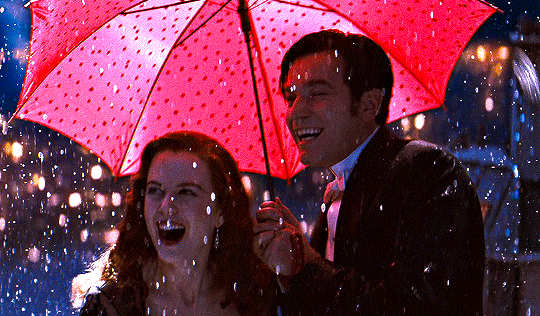
The story of a pained artist searching for a lost love and losing her is all over the goddamn place, with the crazy-ass Moulin Rouge being a solid example of it.
But OK, let’s finally begin Orpheus, or Orphée to be more accurate. Gonna be a weird ride, I guarantee it. SPOILERS AHEAD!!!
Recap (1/2)

The story starts with a recap of the original myth, and notes that it doesn’t need to be limited by time and place. This sort of story, after all, could happen anywhere and at any time. And in this case, that time and place are 1950s-era France, where we quickly meet famous poet Orpheus (Jean Marais).
At a café, he meets a friend, the Editor (Henri Crémieux), where they speak on Orpheus’ fame, which is not well-liked in a cafe frequented by poets. Also arriving there is a young drunken poet, Jacques Cégeste (Édouard Dermit), who is accompanied by his patron, known only as...the Princess (María Casares). Come on, guys, can we give our female characters names, please?

Anyway, Jacques quickly gets into a drunken brawl with other patrons, which leads to the arrival of the police at the café. They forcefully arrest him, but before they can, he’s hit by a couple of motorcycles, and potentially killed. The police bring Jacques back to the Princess’ car, with the help of her driver Heurtebise (François Périer). For unknown reasons, she summons Orpheus to help them. He agrees, and goes with them to the hospital.
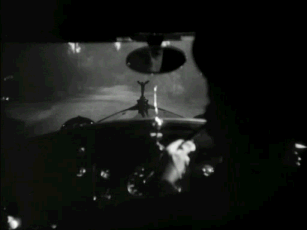
Or he would be, if they were going there. Instead, as they drive off, Orpheus discovers that Jacques is dead already. They aren’t going to the hospital. Instead, they head to a mysterious mansion, as ominous and oblique poetry plays on the radio. They’re soon accompanied by the men on the motorcycles that killed Jacques, who work for the Princess. The plot fuckin’ THICKENS.

Back at her mansion, they bring the body of Jacques upstairs, much to the confusion of Orpheus, whom the Princess keeps calling stupid whenever he asks questions. However, he’s not proving her wrong, as she immediately convinces him that she’s actually dreaming at the moment. Although...maybe he is?
She sits in front of a mirror, which breaks...somehow. Frustrated, she commands Orpheus to wait there for her to return, as she goes to check on Jacques and her men. Like me, Orpheus is confused. This gets worse for me, though, as the Princess goes to the other room and tells the dead Jacques to get up. AND HE DOES. Well, Jacques’ a zombie, I guess. He identifies the Princess as “his Death”, which she agrees to. She tells him to hold on to her coat, and then...
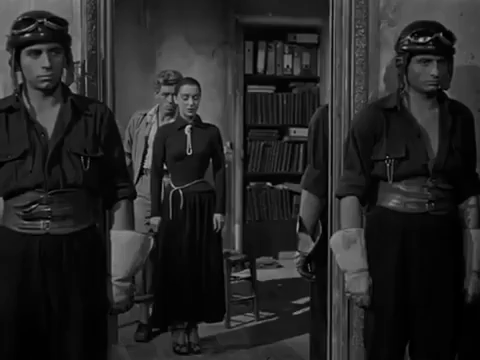
...I got questions. I GOT QUESTIONS HERE.
They go through the mirror, and the Princess’ henchmen follow, just as Orpheus walks in. He also has questions, and he tries to go through the mirror, to no avail. Completely confused at this point, he passes out against the mirror, alone in the mansion. And then...he’s outside.
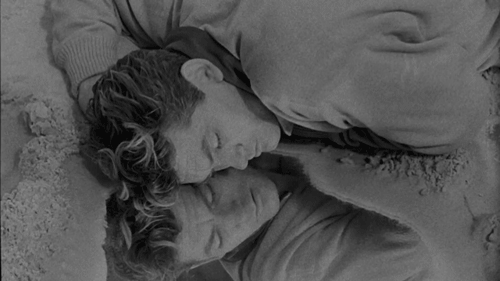
Yeah, he’s just outside now, and waiting there is Heurtebise, the chauffeur! Orpheus is freakin’ out, and Heurtebise has no answers for him, but has been told to take him back to town once he...arrived. OK. Still questions.
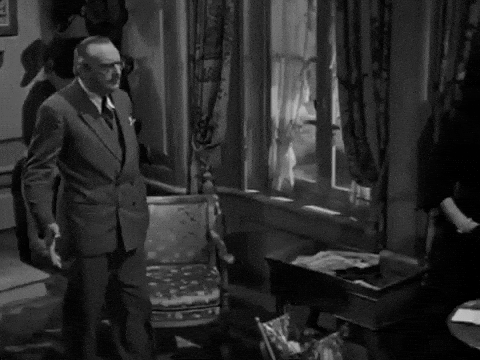
In town, the disappearance of Orpheus is being discussed by a police inspector, his wife Eurydice (Marie Déa), and her friend Aglaonice (Juliette Gréco). Aglaonice doesn’t seem to like Orpheus very much, as she’s trying to convince Eurydice that he’s cheating on her. And that’s hard to argue, since he was last seen with the Princess. However, just as there’s about to be a scandal reported by a spontaneously appearing journalist, Heurtebise and Orpheus arrive home.
After a rough encounter with the journalist, he arrives home to a relieved Eurydice, and an enraged Aglaonice, whom Orpheus also dislikes heavily. He’s apparently forbidden her from entering his house, and tells her off. The Inspector leaves too, and asks Orpheus to come to his office to discuss the matter of the missing Jacques.
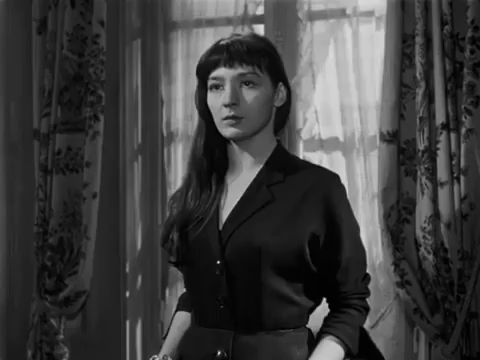
Eurydice reminds Orpheus that Aglaonice is dangerous, as she runs...the League of Women. Well...I think we know what role Aglaonice is going to play by the end of this. Her and her League of Bacchanalian Women, get me? Yikes. Anyway, the conversation turns into an argument, when the EXTREMELY ornery Orpheus basically just storms off, being a DICK to his poor wife. And when he goes upstairs to his room, he actually sneaks out of the window.
Meanwhile, Heurtebise comes into the house to offer an alibi to the pained Eurydice. While she doesn’t quite believe it, the two share some time together and seem to bond. However, when he smells gas from the stove, Heurtebise lets it slip that he committed suicide by using a gas stove. He covers it up before Eurydice notices the slip-up, but...OK. So, “the Princess” is death. Going by the traditional Greek myth, she’s some form of psychopomp, and the world beyond the mirror is the Underworld, I can only assume. OK...I can dig it.

Orpheus, meanwhile, is at the car, listening to the strange radio poetry and writing it down. The, uh, “Princess” is busy as well. Like a ghost, she walks into the household and watches Orpheus as he sleeps. A narration refers to her as Orpheus’ death. Funny, I’m pretty sure that’s going to be Aglaonice’s role.
Two days later, Orpheus is increasingly obsessed with the poetry from the mysterious radio and its odd messages. While Eurydice seems to mock this obsession, Orpheus also seems to be far too enraptured in it. But, interestingly, the messages seem to be coming from nowhere known. However, it’s all beginning to affect their marriage greatly.

On the phone, the Inspector comes calling, and Eurydice asks Heurtebise to answer the phone. He does so, and soon after, we see the phone float into place, as if placed there by a ghost. That’s confirmed as Heurtebise phases to the outside from nothing, where he meets Orpheus and informs him of the message. The two decide to head to the Inspector in his car, rather than the mysterious talking car.
While Orpheus goes through town, looking for the Princess rather than the Inspector, there’s something that I wanted to mention here. Call it an interpretation. Apparently, Heurtebise is often considered an angel by critics and interpreters. However, I’m gonna suggest that he’s actually supposed to be a representation of Hermes, the messenger god and a psychopomp who escorted souls to the Underworld. Not sure about the Princess yet, but Cocteau apparently never meant for her to be portrayed as actual death. Interesting.
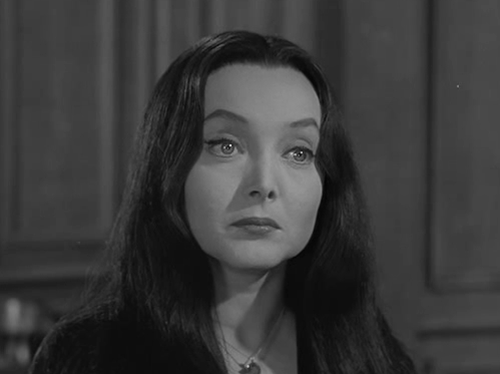
Meanwhile, at the Inspector’s office, both Aglaonice and Orpheus’ poet friends (supposedly) are accusing Orpheus of being involved in Jacques’ disappearance. The Inspector turns them away, just as Heurtebise and Orpheus reconvene in town. While Orpheus didn’t find the Princess, Heurtebise says that she came by, saying that he could stay with the married couple for now.
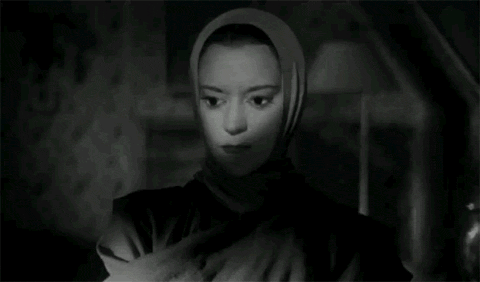
Speaking of the Princess, we see her at night, staring over Orpheus. And her eyes are...strange. They seem artificial, and it bothers the EVER-LOVING SHIT out of me. And the whole affair isn’t helping Eurydice either, as she’s tired of Orpheus’ obsession with the car, and is planning on going to Aglaonice for advice. Heurtebise tries to stop her from doing so, but she insists. But when she goes...the motorcyclists come for her. And she’s dead. As proven when the Princess arrives through the mirror.

Alongside her comes Jacques, acting as the Princess’ servant. She notes to him that their work isn’t easy, and couldn’t be done if she were dressed in the way the humans portray her. So, she is seemingly Death, or at least an aspect of Death. Obviously, as we’re talking about the Greek story, we can assume that she’s meant to be Hades in particular. But, we’ll see. It’s also confirmed, by the way, that the mysterious messages are indeed Jacques’ poetry, recited by him on the radio waves from beyond the grave. Neat.
Heurtebise is clearly upset with what’s just happened to Eurydice. He asks if the Princess actually had orders to kill Eurydice. She avoids the question, and guesses correctly that Heurtebise has fallen in love with Eurydice. He confirms this, and counters with the fact that the Princess has seemingly fallen in love with ORPHEUS. The plot fucking THICKENS.

Good place to pause, I think. Halfway mark and all. See you in Part Two!
#orpheus#orphee#Orphée#cocteau#jean cocteau#orphic trilogy#jean marais#François Périer#María Casares#Marie Déa#Juliette Gréco#Édouard Dermit#fantasy march#greek mythology#user365#365 movie challenge#365 movies 365 days#365 Days 365 Movies#365 movies a year#surreal film
10 notes
·
View notes
Text
“If you look up actual bonafide tenors, you’ll see a massive difference with how they achieve high notes compares to his screaming and straining.”
I didn’t want to write a response to this but I feel like I need to and I kind of want to.
It’s unfair to compare Harry to tenors because he isn’t one. You need to compare him to other baritones who can actually achieve those high notes Harry so desperately wants to hit.
Now, I know, some people might say that comparing a Hollywood singer to a Broadway singer is unfair but there’s a reason some people believe Harry would benefit from doing a professional musical. You have to take care of your voice if you’re going to be performing 8 shows a week, which Broadway performers do. Brendon Urie performed in Kinky Boots for a couple of months and although he was already a phenomenal singer, he came out of that show with better and healthier technique all around. Jeremy Jordan is a fantastic example of what Harry’s voice could potentially amount to. Jeremy is a powerhouse vocalist in the Broadway community and he’s also a baritone.
https://www.youtube.com/watch?v=0wVpd-CgSLI&ab_channel=BenjaminRauhala
^this is probably one of the highest songs he’s ever sung live^
Most people call Jeremy a tenor though he typically sings songs within the baritone range. It’s very easy to forget that he is technically a high baritone who has the ability to hit some killer tenor notes because he has a lighter quality to his voice that makes notes seem higher then they actually are and his belting technique is just that damn good. Like, it’s actually insane how good his belting technique is…
However, even as a Jeremy Jordan fan, I will freely admit that he does struggle with his lower register quite a bit, at least it seems that way from when we’ve heard him use it but it’s very rare that we get to hear it because as I said, he’s quite well-known for his higher range and his belting, so he’s going to be hired to and will most likely actively choose to sing those types of songs. Like that anon said before, higher singing gets more attention and praise. Baritone is the most common male singing range (bass profundo is the rarest if you’re curious and you should look them up, those dudes are fucking subwoofers) which I figure is why a lot of men don’t want to be baritones because it’s considered ‘average' but Jeremy is one of the best examples around of how amazing a baritone range can be if you know how to use it and are willing to play around with it. He’s also one of those singers I would imagine a lot of baritones strive to be.
If you want to hear an actual tenor singer sing a actual tenor song to see the difference regarding Harry’s range and a tenor range, look no further than the character of Orpheus in the musical Hadestown. I’ll link the original version of the song below (sorry, I don’t like the Broadway version of this song lol) for anyone who wants to liste.
https://www.youtube.com/watch?v=pDAMGVDvffo&ab_channel=OriginalCastofHadestown-Topic
This is a bonafide TENOR song, it’s also one of the highest male roles on Broadway at the moment. If Harry’s performance of Two Ghosts on the Late Late Show is anything to go by, I believe this song would largely be in Harry’s falsetto (that whisper quality when someone sings really high sometimes). Again, you can’t compare a tenor who can hit a lot these notes in his head voice and a baritone like Harry that would most likely only be able to hit most of this song in his falsetto voice, Jeremy Jordan probably would have trouble with this song as well, not even gonna lie. Actually, knowing Harry, he’d probably try to hit all that shit in his chest voice cause he’s way too comfortable in his chest voice and tries to hit everything using it which is a big reason why he struggles with high notes so much.
I’ll just leave this hear because it’s another tenor singing this and I love it lol:
https://www.youtube.com/watch?v=x2RRjqfynuM&ab_channel=AntonioCiprianoMusic
6 notes
·
View notes
Note
15, 16, 19, 24 for musical theatre asks
Thanks a lot for the asks! I love musicals so this was a lot of fun to do!
15. Broadway actor, you’re proud of
This might be an odd pick, but I’m proud of Reeve Carney from Hadestown. When I heard the cast recording and saw his face during press tours, I was like ‘where have I seen him before?’ And to my surprise, he was the one who originated the role of Peter Parker in the failed musical production Spider-Man: Turn Off the Dark. I was so happy that he was given another chance for Hadestown and he is an amazing performer!
16. Broadway actor who deserves more recognition
I’m not sure. Unfortunately, I don’t know much about the actors. I’m the type of person who listens to cast recordings constantly. But I can tell you the original cast of Six and Something Rotten deserve so much more than people say about them.
19. two contrasting styles/genres you love
The historical meets modern genre/style. Two examples include Six and Hamilton. I also love shows that are full of satire and aren’t supposed to make sense. Or rather they don’t make sense on paper. I think Rocky Horror fits into that category and (of course) Something Rotten. And I love some musical adaptations of musicals that take the original concept and add music. Fantastic examples include Beetlejuice and School of Rock. Both weren’t movie musicals but somehow work as a musical.
24. show that shouldn’t have been revived
Don’t hate me. But I don’t think The Music Man should be revived for the next season. I mean as much as I love The Music Man, I think it’s a bit outdated and the only people who would want to see it are those who like classic musicals or musicals from a period that doesn't apply to today. I was in The Music Man in middle school (I was an extra) and I’ve watched both film versions. When I heard it was being revived, I didn’t care. But when I heard it was going to replace Beetlejuice, I got irritated. Yea. I’m sorry but I don’t think this musical should be revived. It’s outdated and it’s difficult to make it relevant to a modern audience.
2 notes
·
View notes
Note
What modern musical do you think has the best set design in terms of cleverness? I think that the falsettos revival did a fantastic job using the blocks in the ways they did.
the broadway production of NPGC1812, closely followed by the Once On This Island revival :) (once again, only shows i’ve seen. have not seen Hadestown and i did not see the Oklahoma revival...for example.)
let’s do a theatrey ask me anything where you also answer the question you ask me
13 notes
·
View notes
Note
3,11,12,18, and 19 for the Hadestown ask game babey!
thank u for giving me this opportunity to infodump sdfsdf
3. What’s your favorite song?
ahhhh, that’s so hard!!! maybe “Way Down Hadestown” or “Our Lady of the Underground” or “Wait for Me (Reprise)” but another one of my favorite moments in general is the transition from “Epic II” into “Chant” sdfds
11. Is there any version of any song you prefer over another? For example, do you prefer a certain song with the NYTW cast rather than the Broadway cast?
as a whole, I would say that I prefer the Broadway cast recording to the NYTW recording because it feels much more complete, the book feels tighter, and I prefer the characterizations of Orpheus and Eurydice in the OBCR (esp Orpheus), but there are a lot of little moments or lyrics that they changed from the NYTW recording that I miss. off the top of my head, some of the things I especially loved in the NYTW recording include the extra dialogue between Eurydice and The Fates during “Way Down Hadestown (Reprise),” and I also really miss Persephone’s verse during “Chant II.” I know that they took it out because they wanted the song to be more of a bull/matador match between Hades and Orpheus, but I loved Persephone directly addressing Eurydice. the few interactions they shared with each other onstage were always so beautiful to me, so I’ve always been rly soft for Persephone’s “when I was a young girl like you, sister, I was hungry too...”
12. Do you remember the first time you listened to Hadestown? What about it caught your attention the most? Do you remember how that first listen made you feel?
the very first time I listened to it was summer of 2019, but I don’t think I finished listening to the entire album that time because I had to go do something else, but it was enough to convince me to download both the OBC and NYTW recordings. (it wasn’t until November 2019 when I listened to the entire thing and it became my new hyperfixation.) but the first time I started listening to it that summer, I was sitting by the window during a rainstorm. it was a pretty meditative, pensive experience, and the rainstorm especially felt fitting when I got to “A Gathering Storm” and “Chant.” what caught my attention the most was everyone’s voices, I think. everyone sounded so fantastic, and I was especially obsessed with André De Shields. I also remember just hearing “Road to Hell” and immediately being like “oh YES this is THE GOOD STUFF” like that fucking trombone HITS U dsfdsf
18. What was your reaction the first time you listened to the album and heard Orpheus turn around?
you know a bitch cried dfsdfsf tbh even now if I listen to the album as a whole, it’ll still make me cry, and there’s been a few times I’ve listened to the album on one of my walks and I would start crying in public bc of the ending dfsf bc especially hearing Hermes in “Road to Hell (Reprise)” it’s like how do I not sob
19. What’s your favorite song to jam to?
“Road to Hell,” “Way Down Hadestown,” “Chant,” “When the Chips Are Down,” and “Wait for Me (Reprise)” are all absolute bops, but I especially like listening to “Chant” when I’m running bc it makes me feel so powerful dfsdf
2 notes
·
View notes
Text
Motif similarities between Les Misérables and Hadestown - an analysis (sort of?)
I've had the idea for this since maybe August at this point but put off writing it. But when when I saw a meme about this exact thing floating around tumblr I knew I had to finally write it down.
Disclaimer: I'm using the original cast recording of Hadestown as a reference, not the new Broadway cast recording.
The motifs I'll be examining are:
"Look down" (shortened to A)
"Keep your head low" (shortened to B)
A first appears in the prologue of Les Misérables, established as the first of the main motifs of the show.
As a theme, it's tied to and even representative of the downtrodden, the poor and the oppressed. The people who ended up with the short end of the stick and don't have any chance to rise up - apparently.
First, we see it applied to the chain gang, convicts in Toulon, forced to work hard and long hours. Similar to B, where the motif is applied to the Hadestown workers as well.
In both situations, we first see the motif in the song that actually introduces the antagonist as a character, what they're all about.
In Les Misérables, this is the cruel and unjust regime, represented by Javert.
In Hadestown, this is Hades, ruthless factory lord and "King" of the underworld. (One could argue that Hades is first introduced in Way Down Hadestown, but Chant I is arguably the song where we actually get to know him and what his deal is).
In both situations, again, the "keep your head down, don't look up" mantra is representative of how the authorities, in Les Misérables as well as Hadestown functioning as the antagonist, keep the masses, the poor, the downtrodden subdued. They don't even allow them to look up and take in the world around them and its possibilities - no, it's all about avoiding the authoritarian gaze of the oppressor.
It is interesting to note that both those themes, musically, are sung in the steady simple beat of a work song. These are, historically speaking, songs that have been sung by workers and slaves during hard, monotonous tasks such as, for example, farming and agricultural work in general. It invokes the image of the workers, in both musicals, as slaves, whether (apparently) voluntary - Hadestown - or involuntary - Les Misérables.
And now it gets interesting.
The inherent property and point of a motif is that it develops, grows to represent the same thing but in different contexts.
In Les Misérables, we see a slow but steady development - A starts as something the oppressor, the regime and it's representatives, use against the downtrodden, and becomes something the downtrodden use against their oppressors.
The second time it shows up in Les Misérables, in the song Paris/Look Down, the poor use it as a call, almost a demand, begging the wealthy and fortunate to look down and pay attention to their plight and suffering.
"Look down, and show some mercy if you can"
While not yet completely daring to use the motif as a sign of superiority over the wealthy, the downtrodden have at least reclaimed it as a call for attention and a demand for acknowledgement.
------------ ****** ------------- ***** -----------
In Hadestown, we see that with the arrival of Orpheus in the underworld the workers slowly begin to at least try to break the cycle of looking down, keeping their heads low.
Chant II has the very fascinating line:
"We're gonna count to three
And then we'll raise our heads
Singing one, two-
Is it true?"
The workers intend to question Hades, to look up and metaphorically see what it all is really about.
But they don't get to three.
The cycle is not yet broken.
In contrast, the Broadway version has the added line:
"If you can do it so can she
If she can do it so can we"
"It" being an act of defiance against the will of Hades, in the case of the lovers it's leaving Hadestown, but in the case of the workers it's throwing off Hades' brainwashing (perfectly exemplified in Why We Build The Wall) and revolting.
Even Hades admits this in His Kiss The Riot:
"Bravery can be contagious"
But as we all know, Hadestown is, after all, still a Greek tragedy.
The ending is bittersweet, and really more bitter than sweet even then. Orpheus, the figure of hope and inspiration for the workers, fails in his endeavours. And just like him, the workers too aren't successful in their quest for complete freedom.
It shall not go unmentioned though that there is a glimmer of hope. Hades and Persephone decide to try again. Maybe Hades will listen to Persephone. Freedom-loving, worker-sympathetic Persephone.
And yet, even then the workers are dependant on the will of their "Queen" in their quest for rights and freedom.
Like Hermes said, it really is a sad song.
------------ ****** ------------- ***** -----------
In Les Misérables on the other hand, while the big revolt (the June rebellion of 1832) fails as well, the motif is still completely overturned in the end. Yes, in general the downtrodden have not been successful in their pursuit of liberty - but one of them has finally managed to break his metaphorical chains.
Jean Valjean, the biggest victim of the Look Down mantra that has been hammered into his head for 19 years, finally uses the very same words and melody against everything that ever kept him down represented by Javert.
"Look down, Javert, he's standing in his grave."
Here, Valjean completely turns their dynamic around and uses Javerts motif against him. He doesn't have to look down anymore - he has the moral high ground. Now it is Javert who is called - commanded - to look down.
The motif made a complete 180, now not referring to institutional power anymore but to moral superiority. After being the one to "Look down", and to comply with Valjeans demands, Javert as we all know falls into an existential crisis that leads to his suicide.
Now - what do we take from this motif?
Clearly, it is used by the unfortunate - workers, beggars, convicts - to show their helpless and desperate situation due to their oppressors.
The oppressors being the wealthy, the ruthless, capitalist overlords and unscrupulous monarchists.
Anaïs Mitchells Hadestown is, as should be widely known by now, a very capitalism-critical work.
Les Misérables' main focus has always been on the social injustices that permeates society even to this day.
And both these fantastic, incredible shows tell us one thing - this motif can be turned around.
It can be reclaimed by the oppressed, it can be rejected.
It can even be used against the oppressors.
WE can use it in this way.
And that, friends, is something I can fully get behind.
#AH MY BRAIN BABY#les mis#les miserables#les mis analysis#les mis fanwork#Hadestown#Hadestown fanwork#Broadway#musicals#jean valjean#Victor Hugo#les amis de'l abc#les amis de l'abc
37 notes
·
View notes
Text
I’ve spent a lot of time trying to figure out what the “masses” will buy and what they won’t. clearly it’s not as cut-and-dry as who wins Tony’s – The Band’s Visit, the relative underdog of its year, swept for 10 Tony’s last year and yet Hadestown, a pretty obvious winner, got 8 and exponential more popularity – but there are clear patterns. plays are always going to get very little recognition (I got tickets to best play winner The Ferryman 30 minutes before the show began for $40 straight-up, a fantastic spot in the back orchestra) but even some of the musicals are sort of... anomalies?
I guess I’m mostly thinking about The Band’s Visit, which closed early because they were running out of money. The Band’s Visit, which made history for so many Middle Eastern theater creators, swept its awards season, got a Grammy of all things, closed because of money. and you would think that means the other shows would be closed, too, but 2/3 of the shows which lost best musical are still running. shows which didn’t win any Tony’s at all!
and I suppose that’s because The Band’s Visit refused to be commercialized, was firm in its silence and poignancy, but I can’t say that Hadestown, with a line running down the block at 9am, 3 hours before they start selling, Hadestown with its years of work and heart poured into it, has commercialized itself.
but even still, there’s something you can market in Hadestown, in the power of this show, voices strong and echoing throughout a space, an age-old story that we all can trace in novels and in poems but told anew. I think the marketing is done in a genius way, focusing on the actors and the sheer strength of everyone, something uplifting
and I can’t help think that The Band’s Visit closed because it never really was about strength, was it? it was about loss, and quiet moments, and the things left unsaid. it was some unknown story told in Hebrew and in Arabic and in broken English. it’s about characters, not a story, whereas Hadestown is about a story and its characters. the distinction seems important: what makes Hadestown intriguing is the story which we knew getting changed because of this light shed on characters, but that story still drives it. The Band’s Visit seemingly has no story. the band visits. it’s in the name, Dina says, it’s not very interesting. it’s about people, not what they do, but just who they are in stagnancy.
and I just use Hadestown as an example: those other best musical nominees are stories retold which we know and love. the year before that, Dear Evan Hansen wins because of the power of this story. Hamilton wins because of an untold story, etc. I think, in fact, Hadestown is the least prone to that senseless commercialization of the others, because it is fundamentally a show that is hard to sell, but it... works? I guess I wish I knew how it worked so well, how it cracked the code that Great Comet couldn’t quite. what makes such a bizarre musical marketable? is there really a difference in adapting Orpheus and Eurydice vs. War and Peace? there must be, and I can’t help that think that Hadestown uses very similar techniques to Great Comet, but to greater avail because Great Comet sort of, must have, paved the way.
(but I do think Hadestown was obviously going to sell better than Great Comet, though the fanbases are about the same... general theatergoers already know about Orpheus and Eurydice and the story is so accessible while War and Peace is so utterly alienating. which is horribly depressing, but something in that shuts people off. I wonder how Moby Dick, will fare in the world of New York theater, because that text is similarly alienating though more widely-read.
and, on that point, you can walk into a theater not knowing about Orpheus and Eurydice and feel just fine, we lean towards the Greeks and sort of consider it a general part of our Literature Canon, but people are frightened to walk into a War and Peace musical unknowing. something about assumed elitism, I’d wager, which shuts out quite a lot of older theatergoers.)
God, it just makes me kind of sad, to think that this show which won so much was destined for ending because it was literally unable to market itself as some grand spectacle. The Band’s Visit is a boring story about nothing really in particular, and how is that a sell?
you can’t sell it without talking about the acting, the singing, the music, but when I try to think of myself explaining it to people, it falls flat. how do we explain something touching us like that, in the way that The Band’s Visit does? there is no loud pain, no perfect screenshots, no hands reaching for hands and voices crying out set to music. it’s men and women refusing to say things and singing about characters on a screen.I can really only think of Omar Shariff as a song to show in order to convince, which is why they performed it. it has the voices curving in and out and hands floating around the face, but it is not The Band’s Visit. I feel the musical most, if anything, in its scenes and its quiet.
I guess I’m just getting sad again. I’m really happy to see Hadestown see such amazing success after what happened to Great Comet, but between these two years is The Band’s Visit, which, I feel, is something which will be forgotten. so overlooked by audiences and for a reason which I can only believe are also the reasons that made it so good: the irrelevant story, the powerful characters, the quiet moments.
The Band’s Visit... deserved so much more
#personal#long post long post#i feel like this comes off as negative 2 Hadestown which i'm NOT please i just like... know... that TBV got robbed
19 notes
·
View notes
Note
17, 18, 21, 33, 34, 44, 49, 50 for the theatre asks please?
Ooh thank you my dear! I had fun answering these!
17: Favorite scene(s)?
The entire bedroom seen at Amalia’s house in the 2016 revival of She Loves Me. The chemistry and the comedy are amazing and I crack up every single time, GOD I love those two and that musical.
18: Favorite musical number(s)?
The Room Where it Happens (Hamilton), The Confrontation (Les Mis), She Loves Me (She Loves Me), Why Do We Build the Wall (Hadestown), Defying Gravity (Wicked), So Much Better (Legally Blonde), God Help the Outcasts (Hunchback of Notre Dame), and You Can’t Stop the Beat (Hairspray), to name a few!
21: Favorite score(s)?
Hunchback of Notre Dame and Les Mis.
33: What is your dream role?
Valjean in Les Miserables but alas I am not a man. I did get to play him in a Les Mis concert that I put together though! I would also love to play Persephone in Hadestown or Elphaba in Wicked.
34: What musical would you like to see turn into a movie?
Mmm. Good question. I want all Broadway shows to have a professional recording available for those who don’t get to the theatre/can’t afford the theatre, and so you can have the pleasure of watching it over and over again, but that’s different from a movie and some shows just don’t translate well to movies because you’re jumping mediums. Hamilton, for example, I kind of don’t want it to be made into a film, same with Bandstand.
I think it’s a tie between She Loves Me and Hadestown. The former is a perfect fit for the fun “movie musical” genre and we could make it gay by having me star as Georg I mean what and the latter has to do with mythology and so I think the production team would have a fantastic time really working that “movie magic” to the hilt and giving a really fantastical/otherworldly experience to the audience.
44: Worst experience in the theatre?
As an audience member, when I went to this regional collegiate theatre workshop-slash-competition that included a bunch of college productions and I had to sit through the most mind-numbing idiotic confusing hipster bullshit adaption of The Tempest that I swear making us watch violated the Geneva convention.
As an actress, being in A Phoenix Too Frequent. Of my two costars, one is a lovely girl but she had a complete mental breakdown, and the other was a guy who has matured greatly but at the time was the most annoying and aggravating idiot, and I was sick so I was violently coughing and feverish during all the performances.
BUT I SURVIVED.
49: Favorite choreography in a show?
Tie between Bandstand with its swing and amazing costume changes and Hamilton with its intricate towing the line between stage business, choreography, and blocking. They’re done by the same person, actually, haha, so that makes sense.
50: If you could have dinner with any 3 Broadway people (actors, composers, directors, etc) who would it be with and why?
OH MAN. Lin Manuel Miranda, Anaïs Mitchell, and Ethel Merman. LMM is a fuckin’ genius and I would love to pick his brain, Mitchell is a huge inspiration having taken Hadestown from a concept album in 2010 to a workshop to an Off-Broadway, all the way to winning the Tonys. And Ethel Merman was the undisputed queen of Broadway--she originated so many iconic roles, her voice was BOOMING and this was before microphones, and she was brilliant at comedy. Such an icon.
2 notes
·
View notes